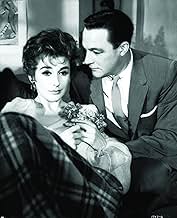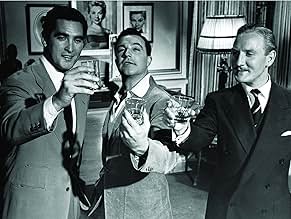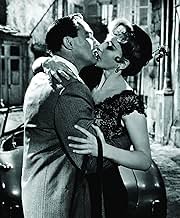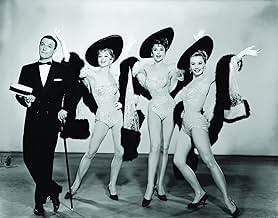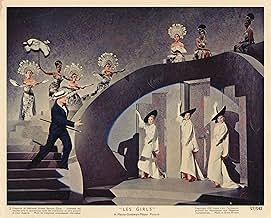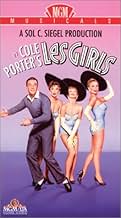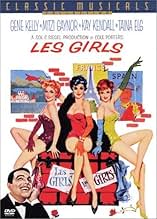VALUTAZIONE IMDb
6,6/10
3237
LA TUA VALUTAZIONE
Aggiungi una trama nella tua linguaThe former members of a dance troupe are suing because of recently published memoirs. Each one insists on own point of view.The former members of a dance troupe are suing because of recently published memoirs. Each one insists on own point of view.The former members of a dance troupe are suing because of recently published memoirs. Each one insists on own point of view.
- Vincitore di 1 Oscar
- 7 vittorie e 7 candidature totali
Richard Alexander
- Stagehand
- (non citato nei titoli originali)
Gordon Armitage
- Courtroom Spectator
- (non citato nei titoli originali)
Frank Arnold
- Taxi Driver
- (non citato nei titoli originali)
Herman Boden
- Angèle's Backup Musician
- (non citato nei titoli originali)
Brad Brown
- Court Barrister
- (non citato nei titoli originali)
Barrie Chase
- Dancer in 'Les Girls' Number
- (non citato nei titoli originali)
Lilyan Chauvin
- Dancer
- (non citato nei titoli originali)
Robert Cole
- Biker in 'Gone About that Gal' Number
- (non citato nei titoli originali)
Recensioni in evidenza
Gene Kelly was one of the most talented and charismatic performers in classic musicals, some of his dance routines being among cinema's most jaw-dropping. And George Cukor was a fine director with a filmography that contained a number of favourites.
Both have done better films than 'Les Girls', in fact everybody involved pretty much has, but the film is definitely well worth watching and is entertaining in its own right. To me, what came off least successfully is the story, which is basically a musical version of Akira Kurosawa's 'Rashomon' (except that film handled its story structure much better). It is certainly intriguing, and it is difficult to resist its often risqué and disarming nature, but it does struggle at times to sustain momentum and material for a running time that feels over-stretched, making the latter half pedestrian narratively. And while interesting the flashback structure doesn't always feel as smooth as it could have been, some of it clumsy and disorganised.
Cole Porter's songs have been criticised for reasons that are understandable. None of the songs are bad, Porter was too good a composer/song-writer to write bad music, and are reasonably pleasant, but this is not one of Porter's better song scores. Pleasant enough, but nowhere near as memorable or as inspired, apart from some witty and naughty lyric-writing (though there are instances where they are over-shadowed by some distracting stage business in the choreography), as they could have been, disappointing for a great composer/song-writer who should have gone out on a high note but didn't. Jacques Bergerac is also insipidly dull in a role with practically nothing to it, basically the sort of role that's there for the sake of being a plot device but nothing more.
Despite how this all sounds, 'Les Girls' does have a number of merits that it is difficult to be too hard on it. The best assets are the production values and the performances of the ladies. 'Les Girls' is simply a stunning-looking film, the colours are eye-poppingly ravishing, the sets are lavish, the costumes are beautifully chic and the cinematography often dazzles. The ladies manage to steal the show under those who most would naturally see the film for (Kelly, Cukor and Porter). Particularly note-worthy is the perfection that is Kay Kendall, who is charming and hilarious and would have had a bigger career if it hadn't been cut short so early and tragically. Mitzi Gaynor also has fun with her role and makes the character sympathetic too, while Taina Elg is suitably sultry.
Kelly is always watchable, and dances with charisma and his usual polish and technical meticulousness in routines that, while not exactly career highlights, do show off how incredible a dancer he was, even if his character is one of his least endearing (though he does bring wit and charm). Cukor makes the most of the production values and there is enough elegance and lightness of touch, but it does seem in the early parts especially that he wasn't in complete control, or entirely trust or was comfortable, with the material. The script is wonderfully witty and also has a risqué boldness and sexiness.
On the whole, not a great film, and doesn't see the enormously talented people in front of and behind the camera doing the best work of their careers, but absolutely worth watching for the production values and Kendall. 7/10 Bethany Cox
Both have done better films than 'Les Girls', in fact everybody involved pretty much has, but the film is definitely well worth watching and is entertaining in its own right. To me, what came off least successfully is the story, which is basically a musical version of Akira Kurosawa's 'Rashomon' (except that film handled its story structure much better). It is certainly intriguing, and it is difficult to resist its often risqué and disarming nature, but it does struggle at times to sustain momentum and material for a running time that feels over-stretched, making the latter half pedestrian narratively. And while interesting the flashback structure doesn't always feel as smooth as it could have been, some of it clumsy and disorganised.
Cole Porter's songs have been criticised for reasons that are understandable. None of the songs are bad, Porter was too good a composer/song-writer to write bad music, and are reasonably pleasant, but this is not one of Porter's better song scores. Pleasant enough, but nowhere near as memorable or as inspired, apart from some witty and naughty lyric-writing (though there are instances where they are over-shadowed by some distracting stage business in the choreography), as they could have been, disappointing for a great composer/song-writer who should have gone out on a high note but didn't. Jacques Bergerac is also insipidly dull in a role with practically nothing to it, basically the sort of role that's there for the sake of being a plot device but nothing more.
Despite how this all sounds, 'Les Girls' does have a number of merits that it is difficult to be too hard on it. The best assets are the production values and the performances of the ladies. 'Les Girls' is simply a stunning-looking film, the colours are eye-poppingly ravishing, the sets are lavish, the costumes are beautifully chic and the cinematography often dazzles. The ladies manage to steal the show under those who most would naturally see the film for (Kelly, Cukor and Porter). Particularly note-worthy is the perfection that is Kay Kendall, who is charming and hilarious and would have had a bigger career if it hadn't been cut short so early and tragically. Mitzi Gaynor also has fun with her role and makes the character sympathetic too, while Taina Elg is suitably sultry.
Kelly is always watchable, and dances with charisma and his usual polish and technical meticulousness in routines that, while not exactly career highlights, do show off how incredible a dancer he was, even if his character is one of his least endearing (though he does bring wit and charm). Cukor makes the most of the production values and there is enough elegance and lightness of touch, but it does seem in the early parts especially that he wasn't in complete control, or entirely trust or was comfortable, with the material. The script is wonderfully witty and also has a risqué boldness and sexiness.
On the whole, not a great film, and doesn't see the enormously talented people in front of and behind the camera doing the best work of their careers, but absolutely worth watching for the production values and Kendall. 7/10 Bethany Cox
There is a unique kind of elegance in Cukor's way to see the world. An elegance that is utterly personal. Witty, warm, enchanting. It could disguise, transform and magnify the smallest, thinnest trifle. I remember feeling my cheeks kind of numb after the film was over, not from laughing but from smiling all the way through. Cukor's reputation as a women's director was no myth. Here, the glorious Kay Kendall, in a character written with a tired left hand, shines all the same because Cukor knew and understood what made her so irresistible. She was, in the history of the movies, like a comet that flashed before us dazzling us and disappearing very fast but leaving behind a unique brand of magic. In "Les Girls" she even dances with Gene Kelly, wears hats and sun glasses like no one ever had before or since. She's an impossibly perfect combination of Allison Janney and Greta Garbo. This is a film that more often than not, people forget to remember. I think it's time to correct that. Rent it or buy it, switch on the weather channel, select a rainy winter Sunday, invite a bunch of friends and have a ball.
This would have been an enjoyable film without the enchanting comic actress Kay Kendall, but with her it's hilarious. It's a musical comedy version of "Rashomon"; a trial for libel where all the principals give wildly different versions of the same events. Gene Kelly, Taina Elg, and even Mitzi Gaynor are all fun, but it's Kendall who carries the show. She is one of those rare performers who can make you laugh with just a look on her face, but when given something like a drunk scene she can make you weep with laughter. Who cares if she could neither sing nor dance. Good score, too.
Sadly, Kendall made only two more films before her untimely death, what a loss to the world.
Sadly, Kendall made only two more films before her untimely death, what a loss to the world.
As the glory days of M-G-M as Hollywood's preeminent manufacturer of musical treasures entered the sunset years, this very stylish bit of fluff, under George Cukor's very astute guidance, graced the CinemaScope/Metrocolor screen. Cole Porter contributed a score quite a bit more slender than his best, with only one standout, "Ca c'est l'Amour" briefly delivered by Taina Elg. Gene Kelly wasn't permitted any extensive opportunities to display his more athletic dancing skills, possibly because Jack Cole seems to have been the sole credited choreographer. Some viewers, reading other IMDb comments on this one, were rather annoyed by the Rashomon-like structure of John Patrick's very clever, in my view, screenplay. But it's all quite sophisticated, at least for 1957, and the "Ladies In Waiting" production number, in which Porter indulges his penchant for the risque, is hilariously reprised as the story progresses, making naughty use of the three leading ladies' attributes.
Robert Surtees lensed the entire production within the confines of M-G-M's soundstages but, with Cukor's favorite collaborator, Hoyningen-Huene, helping to apply the visual gloss, the whole enterprise is much more elegant looking than Hollywood's usual musical output. Orry-Kelly won a well-deserved Oscar for his color costume design, with one gorgeous gown worn by Mitzi Gaynor that probably accounts for most of the votes cast in his favor.
Finally mention must be made of Henry Daniell's drily witty incarnation of a judge whose patience is sorely tried by the frivolity of the case before him and, of course, Kay Kendall's terrifically funny romp as Lady Wren. What a loss to the cinema when she died so suddenly. Her fans, and I am certainly in their forefront, do so regret her early departure. (If you add this one to your video library, the widescreen DVD is the only way to do it.)
Robert Surtees lensed the entire production within the confines of M-G-M's soundstages but, with Cukor's favorite collaborator, Hoyningen-Huene, helping to apply the visual gloss, the whole enterprise is much more elegant looking than Hollywood's usual musical output. Orry-Kelly won a well-deserved Oscar for his color costume design, with one gorgeous gown worn by Mitzi Gaynor that probably accounts for most of the votes cast in his favor.
Finally mention must be made of Henry Daniell's drily witty incarnation of a judge whose patience is sorely tried by the frivolity of the case before him and, of course, Kay Kendall's terrifically funny romp as Lady Wren. What a loss to the cinema when she died so suddenly. Her fans, and I am certainly in their forefront, do so regret her early departure. (If you add this one to your video library, the widescreen DVD is the only way to do it.)
LES GIRLS is the forgotten musical gem of the last great splurge of MGM musicals in the 1950s. It's reception (judging from the other comments here) is less than overly enthusiastic, due to the script. LES GIRLS is possibly the most philosophical of the MGM musicals, because it tackles an immortal issue of mankind: "What is truth?"
Gene Kelly had been leading a highly successful nightclub group around Europe for many years called LES GIRLS. But he has ceased doing so, and disbanded the group. We learn that Kay Kendall has published her memoirs. She has married Leslie Phillips, a wealthy British aristocrat. In her memoirs she describes what life on the road with the act was like, and how she saved the life of fellow dancer/singer Taina Eig when the latter tried to commit suicide with gas. Taina has married wealthy Frenchmen Jacques Bergerac, and she is furious at this libel suggesting that she was mentally ill enough to try to kill herself. She brings an action in London against Kendall.
This being a George Cukor film, he will have many touches in it that are normal. One, that I note, is the justice in this trial is none other than the old Cukor favorite Henry Daniell. Daniell appeared in Cukor's films from CAMILLE (as Baron De Warvell), through THE PHILADELPHIA STORY (as Sidney Kidd), up to MY FAIR LADY (as the Prince of Transylvania at the embassy ball - he only appears in one sequence as he died on the set). Here he is just determined to have an orderly libel trial in his court. In the end, he is just as amazed and perplexed by what he hears as everyone else. Also to be noted is Patrick Macnee, playing a titled barrister.
The act being a song and dance one (with Kelly, leading the two ladies and Mitzi Gaynor) the music is from none other than Cole Porter. It was the last complete music score that Porter made for a film. It is not a bad score, but not up to the par of say SILK STOCKINGS or CAN-CAN (both composed in the early to mid-1950s). My favorite song is "We're Ladies in Waiting" sung by the three ladies in 18th Century costumes. The lyrics suggest King Louis has plans for them outside their normal duties.
As the film continues, Eig produces as her defense that she was not the woman who tried to kill herself. It was Kendall, and she (Eig) rescued her. So now the court and the public have two versions of the story of the "suicide attempt". The final witness is Kelly, who gives his account of what really happened. I won't explain it (see the film) but in revealing what he claims happened he also reveals something of the lies told by him to the two woman and Mitzi Gaynor, as well as some subterfuges he is working out with both Bergerac and Phillips regarding their personal interests in the matter. The results of his testimony settle the trial, and all parties return to their lives. We even see Kelly going home with his wife (Gaynor), who was in the court but never questioned. But now she has questions about the validity of Kelly's testimony! As they yell at each other in the back of their car, we see a man wearing a sandwich board with the eternal question: "What is truth?" on it. And the film ends.
It was only a handful of years before that Akiro Kurasowa's brilliant RASHOMON tackled the same problem, again in relating a legal issue (who was responsible for the death of an nobleman, and how did the nobleman die). The screenwriters certainly picked up on this perennial problem of truth and it's limits, and a courtroom happens to be the best place to show it. Who can tell if somebody has told the truth completely or partially, and if partially why partially? In looking over the issue of telling the truth, note that besides Kendall, Eig, and Kelly, the behavior of Phillips and Bergerac get scrutinized. Gaynor is also pulled in (we have Kelly's version of how and why she behaved - but we never even hear her explanations). The tactics of Macnee and his opposing counsel (and all lawyers, including his Lordship Daniell) are based on playing out certain tell-tale facts that may hide other tell-tale facts. Who, in the end can judge the truth?
It is one of Kay Kendall's best performances, with GENEVIEVE and THE RELUCTANT DEBUTANTE. She was aware, in 1957, of physical problems that she revealed to her husband Rex Harrison. Before the end of the year he knew it was leukemia, and that she was doomed. In his autobiography REX he tells how he made her last two years the happiest in her life. One would never think of the sudden end of such a funny, vibrant actress being so close seeing her with Kelly doing a song and dance duet (and a saucy one at that). For that alone, I would recommend seeing the film to think of such a promising talent that was cut so tragically short.
Gene Kelly had been leading a highly successful nightclub group around Europe for many years called LES GIRLS. But he has ceased doing so, and disbanded the group. We learn that Kay Kendall has published her memoirs. She has married Leslie Phillips, a wealthy British aristocrat. In her memoirs she describes what life on the road with the act was like, and how she saved the life of fellow dancer/singer Taina Eig when the latter tried to commit suicide with gas. Taina has married wealthy Frenchmen Jacques Bergerac, and she is furious at this libel suggesting that she was mentally ill enough to try to kill herself. She brings an action in London against Kendall.
This being a George Cukor film, he will have many touches in it that are normal. One, that I note, is the justice in this trial is none other than the old Cukor favorite Henry Daniell. Daniell appeared in Cukor's films from CAMILLE (as Baron De Warvell), through THE PHILADELPHIA STORY (as Sidney Kidd), up to MY FAIR LADY (as the Prince of Transylvania at the embassy ball - he only appears in one sequence as he died on the set). Here he is just determined to have an orderly libel trial in his court. In the end, he is just as amazed and perplexed by what he hears as everyone else. Also to be noted is Patrick Macnee, playing a titled barrister.
The act being a song and dance one (with Kelly, leading the two ladies and Mitzi Gaynor) the music is from none other than Cole Porter. It was the last complete music score that Porter made for a film. It is not a bad score, but not up to the par of say SILK STOCKINGS or CAN-CAN (both composed in the early to mid-1950s). My favorite song is "We're Ladies in Waiting" sung by the three ladies in 18th Century costumes. The lyrics suggest King Louis has plans for them outside their normal duties.
As the film continues, Eig produces as her defense that she was not the woman who tried to kill herself. It was Kendall, and she (Eig) rescued her. So now the court and the public have two versions of the story of the "suicide attempt". The final witness is Kelly, who gives his account of what really happened. I won't explain it (see the film) but in revealing what he claims happened he also reveals something of the lies told by him to the two woman and Mitzi Gaynor, as well as some subterfuges he is working out with both Bergerac and Phillips regarding their personal interests in the matter. The results of his testimony settle the trial, and all parties return to their lives. We even see Kelly going home with his wife (Gaynor), who was in the court but never questioned. But now she has questions about the validity of Kelly's testimony! As they yell at each other in the back of their car, we see a man wearing a sandwich board with the eternal question: "What is truth?" on it. And the film ends.
It was only a handful of years before that Akiro Kurasowa's brilliant RASHOMON tackled the same problem, again in relating a legal issue (who was responsible for the death of an nobleman, and how did the nobleman die). The screenwriters certainly picked up on this perennial problem of truth and it's limits, and a courtroom happens to be the best place to show it. Who can tell if somebody has told the truth completely or partially, and if partially why partially? In looking over the issue of telling the truth, note that besides Kendall, Eig, and Kelly, the behavior of Phillips and Bergerac get scrutinized. Gaynor is also pulled in (we have Kelly's version of how and why she behaved - but we never even hear her explanations). The tactics of Macnee and his opposing counsel (and all lawyers, including his Lordship Daniell) are based on playing out certain tell-tale facts that may hide other tell-tale facts. Who, in the end can judge the truth?
It is one of Kay Kendall's best performances, with GENEVIEVE and THE RELUCTANT DEBUTANTE. She was aware, in 1957, of physical problems that she revealed to her husband Rex Harrison. Before the end of the year he knew it was leukemia, and that she was doomed. In his autobiography REX he tells how he made her last two years the happiest in her life. One would never think of the sudden end of such a funny, vibrant actress being so close seeing her with Kelly doing a song and dance duet (and a saucy one at that). For that alone, I would recommend seeing the film to think of such a promising talent that was cut so tragically short.
Lo sapevi?
- QuizOn the DVD, Taina Elg says the original cast was supposed to include Cyd Charisse as the American girl, Leslie Caron as the French girl, and Kay Kendall as the English girl. Charisse decided to do La bella di Mosca (1957) instead, so Mitzi Gaynor took her part. At one point, Kendall didn't want to do the film and Elg was tested for her role. Kendall took the part after all, but then Caron withdrew. Elg was tested then for THAT character and received her first major film role. Jean Simmons and Carol Haney were also considered for film roles.
- BlooperDuring the European tour, multiple clips are shown of American-style steam locomotives instead of European-type engines.
- Citazioni
Lady Sybil Wren: If I was a man I'd have nothing to do with me.
- ConnessioniEdited into American Masters: Gene Kelly: Anatomy of a Dancer (2002)
- Colonne sonoreLes Girls
(uncredited)
Music and Lyrics by Cole Porter
Performed by Gene Kelly, Kay Kendall (dubbed by Betty Wand), Mitzi Gaynor and Taina Elg
Danced by Gene Kelly, Mitzi Gaynor and Taina Elg
I più visti
Accedi per valutare e creare un elenco di titoli salvati per ottenere consigli personalizzati
- How long is Les Girls?Powered by Alexa
- TAINA ELG---WAS SHE A BALLERINA?
Dettagli
- Tempo di esecuzione1 ora 54 minuti
- Proporzioni
- 2.35 : 1
Contribuisci a questa pagina
Suggerisci una modifica o aggiungi i contenuti mancanti



